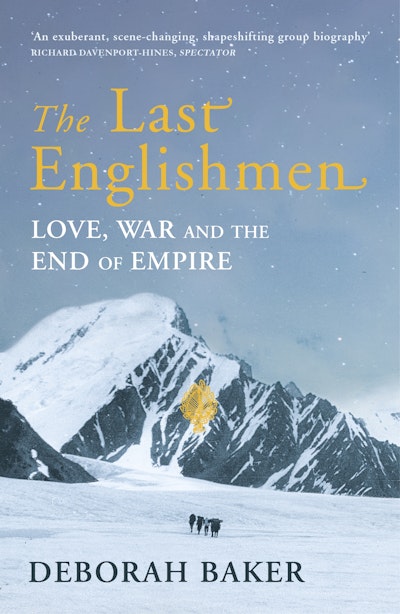- Published: 4 July 2019
- ISBN: 9780099593157
- Imprint: Vintage
- Format: Paperback
- Pages: 384
- RRP: $39.99
The Last Englishmen
Love, War and the End of Empire
- Published: 4 July 2019
- ISBN: 9780099593157
- Imprint: Vintage
- Format: Paperback
- Pages: 384
- RRP: $39.99
Love, war, politics, psychoanalysis, poetry, Calcutta and, especially, the Himalayas – Deborah Baker’s meticulously researched account of India and Britain in the forties reads like the very best of novels.
Siddhartha Deb
Deborah Baker combines a novelistic alertness to the inner life with an anthropologist’s understanding of multiple cultures and a historian’s eye for major events. The result, yet again, is a continuously absorbing and stimulating book, which enlarges the cultural and political history of the mid-20th century even as it grippingly relates the adventures of a few men and women
Pankaj Mishra
A Pulitzer Prize and National Book Award finalist takes readers on a journey through the Indian subcontinent at the closing of the British Empire... Seemingly covering disparate topics, Baker beautifully connects them all with an incisive, clear writing style and sharp descriptions of the terrain. A book for any readers curious about India after 1900
Kirkus
Seemingly covering disparate topics, Baker beautifully connects them all with an incisive, clear writing style and sharp descriptions of the terrain. A book for any readers curious about India after 1900
Booklist
Baker continues her exceptionally perceptive investigation into the lives of Westerners in South Asia...in her most creatively conceived, deeply delving, and wizardly blend of biography and history to date... Baker’s extensive research is seamlessly subsumed within the flow of her novelistic narrative as she brings to life landscapes magnificent and terrifying; volatile love affairs...; seismic political turmoil; and gripping scenes of war. With a uniquely encompassing vision, command of complex information, and profound insight, Baker dramatically chronicles the seminal scientific and artistic explorations of four courageous, ingenious brothers whose achievements enrich our understanding of the still-molten, sharply relevant past.
Donna Seaman, Booklist
A refreshingly novel account… this is skilful work, showing ordinary individuals as they cope–or buckle–while great geopolitical events twist and shape their lives
Economist
An enlightening and utterly compelling read… what really distinguishes the book is its brilliant characterisation and its structural agility. It reads like fiction. Anyone seeking only information will be disappointed. Non-fiction ought always to be this engaging
John Keay, Literary Review
Vivid… Baker tells her story as if it were fiction… The result is a book with the narrative sweep of an epic novel
Peter Parker, The Oldie
Ambitious and entertaining… The history of Empire is seen here through a unique prism
Jules Stewart, Geographical
Wholly original...a dense, rich, exhilarating piece of work that moves deftly between worlds and peoples...she keeps the big events always in view, dramatizing and humanizing the workings of history, particularly the story of empire and its machinations, in a way a novelist would – by making it a story of individuals... It wouldn’t be an exaggeration to say that there is something Tolstoyan to her vast project...remarkable
Neel Mukherjee, Wall Street Journal
In The Last Englishmen, Deborah Baker has written an exuberant, scene-changing, shapeshifting group biography, with John Auden and Michael Spender as its chief human protagonists. But she makes the Himalayas, and Mount Everest, palpable and vivid characters in her story too
Richard Davenport-Hines, Spectator
Satisfying and elegant... The book’s narrative style is inseparable from its conception of history: it illustrates the essential inwardness of historical experience, and its unexpected conjunctions and coincidences evoke the miscellaneous reality of ordinary life. More than once while reading The Last Englishmen I found myself thinking of Stendhal’s account of the Battle of Waterloo from Fabrice’s marginal perspective, in The Charterhouse of Parma, and of Virginia Woolf’s portrait of a nation on the brink of war, without mentioning it, in an English country house in Between the Acts
Edward Mendelson, Book Post
Skilfully constructed… The Last Englishmen… [is] a real achievement
Elizabeth Baigent, Times Literary Supplement
Baker is able to inhabit characters from both [India and England], not merely as political entities...but as confused and deluded human beings, crashing into one another with all the dissatisfaction and self-doubt that membership in your and my species entails. The result is a book that offers not only the historical facts, but also a convincing three-dimensional experience of the withering of European ambitions in Asia.
Rupert Arrowsmith, South East Asia Review




